 Development Dimensions International (DDI) Test - Sample Questions
Development Dimensions International (DDI) Test - Sample Questions
Invited to take a DDI test? DDI offers a variety of pre-employment tests that screen candidates across many career fields.
The two most common tests, often taken together, are the Adaptive Reasoning Test and the various Leadership Assessment tests. Together, these tests cover both cognitive ability and personality and organizational fit.
On this page, you will find sample questions demonstrating the most common DDI Tests, complete with DDI Assessment Test answers and explanations.
DDI Assessment Test - Sample Questions and Answers
DDI Adaptive Reasoning Test Questions
The Adaptive Reasoning Test (ART) by DDI is a cognitive ability assessment that tests your ability to identify figural patterns.
To better explain what this means, let's take a look at two examples:
DDI Adaptive Reasoning Test Example #1

Choose the image that continues the pattern.
A.
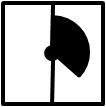
B.
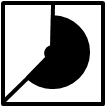
C.
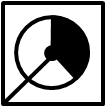
D.
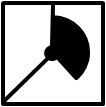
E.

Answer:
1) With Each step, a 45-degree sector (or "slice") of the black circle disappears, moving counterclockwise.
2) With each step, a line drawn from the center of the circle to the edge of the frame turns 45 degrees clockwise.
The correct answer is

DDI Adaptive Reasoning Test Example #2
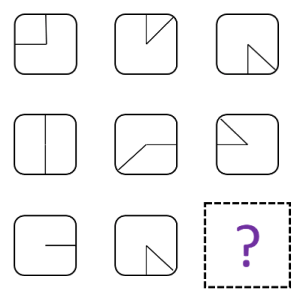
Choose the image that continues the pattern.
A.

B.

C.

D.

E.

F.

Answer:
This is a more difficult question due to several factors. Among them, the two items in each frame, a pair of radial lines similar to clock hands, are hard to distinguish from one another.
Let's attempt to solve this row-wise (by focusing on the left-to-right pattern within each row). In the first row, one of the hands (the vertical one) spins 45 degrees clockwise. The other one spins 90 degrees clockwise. This may seem random, but we can see the same thing occurring in the second and third rows. We can surmise the angles and directions are similar between rows, even though they are arbitrary.
In the second step of the pattern in rows 2 and 3, one hand rotates 90 degrees while the other moves 180 degrees. This is what we expect to happen in the third row.
The correct answer is

Tip: Matrix-based pattern-finding questions like these often use several recurring pattern types. Examples include objects rotating or moving clockwise or counter-clockwise, changing their color/filling according to a predetermined sequence, and more. Practice can help with tests like the DDI ART because the more questions you answer, the faster you will be able to identify these recurring patterns.
On the real assessment, you will have 2.5 minutes to complete each question. The test consists of 15 questions.
The Abstract Reasoning Test is similar to a common assessment of general intelligence known as Raven's Progressive Matrices. Other pre-employment assessments based on Raven's include the Matrigma Test and the Talent Q Elements Logical test.
What makes the DDI ART different from Raven's Progressive Matrices is its adaptive nature. In an adaptive test, the difficulty level changes as you go, becoming more difficult if you are doing well and easier if you are not doing well.
This is why our DDI ART Preparation Pack contains practice tests organized by difficulty.
Learn about the practice pack, or if you are taking the DDI ART along with a DDI personality test, read about our combined DDI Leadership pack.
DDI Personality and Leadership assessments
DDI offers personality tests and leadership tests for both promotions and entry-level positions:
These tests feature Likert scale questions as well as situational judgment questions. Let's view examples of both:
DDI Likert Scale Questions:
A Likert scale question asks you to express your level of agreement or disagreement with a statement on a continuous scale.
I have a straightforward range of objectives that I strive for in a systematic manner
Strongly disagree
Disagree
Neutral
Agree
Strongly Agree
Answer:
The traits measured by this question are conscientiousness and goal orientation.
When ranking yourself on a trait, consider how important it is for the specific role you are applying to. For entry-level positions, these traits are important but not necessarily crucial. For managerial positions, these traits are often considered a prerequisite, as they are needed to ensure a team is working efficiently and meeting its goals.
Whichever answer you choose, remember to stay consistent across the entire test for items measuring conscientiousness and goal orientation. Additionally, extreme answers across many items make you seem disingenuous, so be balanced.
Tip: Each question is designed to rank you on a specific trait, and there are multiple questions that measure the same trait. It's okay to choose extreme or less desirable answers to some of the questions if, by doing so, you are being more genuine, but consider how to even this out using other questions ranking for the same trait.
DDI Situational Judgment Question #1
You are a manager at a marketing firm, and your team is preparing for an important client presentation. One of your team members, Jordan, has come up with a creative but unconventional idea that could potentially impress the client and secure a long-term contract. However, implementing this idea would require a significant shift in the team's current strategy and additional last-minute work, which could stress the team. Some team members are already feeling overwhelmed with their current workload. You need to decide how to proceed.
Which course of action are you most likely to take?
Which course of action are you least likely to take?
A
Decide to implement Jordan's idea, focusing on the potential long-term gains for the company. Communicate the importance of the idea to the team and motivate them to put in the extra effort required to make it successful.
B
Have an open discussion with the team about Jordan's idea, considering both the potential benefits and the extra work involved. Encourage the team to voice their concerns and collaboratively decide whether to pursue the idea, ensuring that everyone feels heard and supported.
C
Reject Jordan's idea to avoid adding extra work and stress to the team. Stick with the current strategy to ensure the team's workload remains manageable and to maintain the current morale.
Answer:
The best option is B. This choice balances the need to explore innovative ideas with the team's well-being.
Answer A focuses on strategic thinking and the potential long-term benefits of Jordan's idea. However, it risks overwhelming the team and could lead to burnout if their concerns and current workload are not addressed.
The worst option is C, which neglects both the strategic potential of the idea and the team's emotional needs by not exploring the possibility of managing the additional work in a supportive way.
Tip: The correct answer to situational judgment questions is usually the one that represents the best balance between two values. In this case, emotional intelligence and strategic thinking.
Many employees use personality tests as part of their pre-employment psychometric testing. Being honest is important since the employee benefits from finding a good cultural fit no less than the recruiting company. While practicing for personality tests can help you avoid common pitfalls, don't pretend to be someone you are not.
Learn more about our all-inclusive DDI Preparation Course, which features practice questions and full solutions to DDI-style situational judgment, Likert, and Abstract Reasoning tests.
DDI Personality tests are often used for nursing jobs. For information about cognitive exams used in the medical industry, read about the Wonderlic Assessment.
Learn to Find DDI Assessment Test Answers
Our all-inclusive DDI Course features practice tests for the DDI Adaptive Reasoning Test, as well as the leadership assessment.
Our practice tests simulate the real exam and help reduce testing anxiety.
Or learn about our DDI Adaptive Reasoning Test Pack
After answering these sample questions, let's get into every DDI test individually. These are the most common ones:
DDI Adaptive Reasoning Test (ART)
DDI’s Adaptive Reasoning Test (ART) is a short online test of 15 questions. The ART is a visual test with no words, presenting a series of shapes with patterns you must solve using what DDI calls “figural reasoning.”
The ART is currently taken by more than 200,000 people per year across more than 90 countries and is typically used to screen applicants for jobs that demand learning new information quickly. The ART adjusts the difficulty of each question, providing more difficult questions after correct responses and less difficult questions after incorrect ones. Because of this, each test-taker receives a unique series of questions. Prepare for the ART test at JobTestPrep.
DDI Career Battery test
DDI Career Batteries are employment personality tests designed to screen a large number of job applicants and, in some cases, to streamline the promotion of those already hired. This DDI test is typically used in high volume hiring scenarios, where employers aim to assess job applicants as quickly as possible.
Career Batteries test the 3 following personality traits:
- Self-management & teamwork - You are asked if you agree or disagree with statements about behavior in the workplace.
- Judgment & decision making - You are presented with challenging work scenarios and asked to judge effective problem-solving solutions from ineffective problem-solving solutions.
- Personal experience - You are asked to choose from a selection of responses that best describe your prior experience in the career field.
JobTestPrep offers practice personality tests and expert tips that will help you pass the DDI Career Battery test or any other personality test you might take.
- For tips on how to pass employment personality tests - Click Here.
- If you want to start practicing personality tests right now - Click Here.
DDI Readiness Assessment
The Readiness Assessments serve as DDI’s personality tests for leadership and sales positions. They provide a full picture of your strengths and weaknesses in the workplace. The Readiness Assessments measure your potential for job success and are used primarily in organizational and corporate development.
Some DDI Readiness Assessments are:
- The Leader Readiness Assessment Test for management positions
- The Sales Readiness Assessment Test for a variety of sales positions
DDI Insight Inventory
DDI Insight Inventories provide insights into your personality traits and abilities in the workplace, highlighting areas for improvement rather than screening for compatibility.
- Leader Insight Inventory - For mid-level managers and supervisors
- Sales Insight Inventory - For sales positions
- Professional Insight Inventory - For professional jobs staffed by college graduates
DDI Skills Test
DDI also offers the Skills Tests. DDI testing covers concrete skills in the Accounting, Finance, Food Service, Legal, Retail, Software, and Medical industries.



